“The aim of every political constitution is, or ought to be, first to obtain for rulers men who possess most wisdom to discern, and most virtue to pursue, the common good of the society; and in the next place, to take the most effectual precautions for keeping them virtuous whilst they continue to hold their public trust.”
The Alleged Tendency of the New Plan to Elevate the Few at the Expense of the Many Considered in Connection with Representation (Federalist No. 57)
From PUBLIUS. As published in The New York Packet.
Tuesday, February 19, 1788
Structural Framework
Why does it matter who the American public trusts? That question has been of social and political importance since our nation’s founding and it’s what led me to create Route 24. Here’s why.
On February 19, 1788 an essay was published under the pen name PUBLIUS (i.e., Alexander Hamilton, James Madison, and John Jay) in The New York Packet. Titled The Alleged Tendency of the New Plan to Elevate the Few at the Expense of the Many Considered in Connection with Representation (Federalist No. 57), it served as a roadmap for preserving public trust. The system was designed to work as a two-way street: those committed to public service were presumed to do so in good faith and, in turn, that faith was reciprocated by the American public when it came time to vote. Should abuse of power occur, surely the American people’s spirit of freedom would help to course-correct. What the essay from 1778 didn’t consider was how the American public could fall victim to interference.
In principle, public trust presumed that all elected officials, members of the press, and their institutions upheld the common good for a better society. In practice, public trust hit roadblocks due to the policies and practices of the party in office. According to Pew Research Center, with the introduction of computers for data analysis in 1958 under then-President Eisenhower, the results of the American National Election Studies (ANES) survey from that year were promising: approximately 73% of Americans believed the government would do the right thing most, if not all, of the time. Yet since 2007, public trust has not exceeded 30%. While such data transparency signals public trust is a policy issue, that framing alone bypasses how interpersonal dynamics impact perception and, in turn, cultural interest.
According to the CIVICUS Monitor’s 2025 People Power Under Attack report, the U.S. civic space rating, which documents the level of civic freedoms upheld in key regions, downshifted from narrowed to obstructed, largely due to an uptick in the use of militarized force on civilian protestors and restrictions placed on public information access and academic and press institutions.
To better contextualize the importance of civic awareness on daily life, Route 24 looks closer at four questions of special interest:
Which significant events contributed to pervasive distrust in news media and government?
Where are the effects of partisan polarization most felt?
Would a lack of public trust persist in the absence of heightened levels of disorientation?
What is the extent to which public trust can be restored?
Driving Force
My name is Sam Reetz, and I founded Millennial Ethics to visually interpret and educate the public about complex issues. On Medium, I’ve written essays and opinion pieces about public policy forums and film festivals, covering human and civil rights issues. In 2017, I began to build an XR civic education gaming experience, Probable Cause, with Millennial Ethics that merged the lanes of immersive storytelling and civic learning to explore issues of public safety from community-centered perspectives.
Over the years, people powered Probable Cause - from the talent that helped to create the vision to the supporters that helped to amplify it. People who may not always agree, but who were committed to learn from each other. People from different generations, cultures, perspectives, and walks-of-life who worked together in pursuit of a common purpose. That is what represents America at its best. Not the many roadblocks faced, but the stories that help us get around them.
Read Shoutout LA for what inspired Millennial Ethics
Listen to The NYWIFT Podcast for key features of Probable Cause
Watch Project Nerd and Muse TV interviews for process teasers
Route 24 is the project’s companion newsletter that invites you to explore our creative process on the project as we build, deconstructing the real-world impact of policies and practices in transportation infrastructure, immigration reform, environmental justice, racial equity, and more to jumpstart public awareness and, in turn, mobilize narrative change. It’s a space for policy debates, immersive storytelling, and social innovation. Passengers on the road to build sustainable progress. Navigators who want to work together and change unjust policies and practices. Artists who merge the lanes of immersive storytelling and civics to curb misinformation and disinformation. Explorers of old routes. Engineers who test-drive solutions. Innovators driving progress forward.
Since launching this newsletter, our readership has grown to reach nearly 900 followers garnering 341 views per month across 24 states and 8 countries.
Our audience overlaps primarily with Letters from an American, In the Writing Burrow, Civil Discourse with Joyce Vance , The Contrarian, The Borowitz Report, Thinking about..., Popular Information, and The Bulwark, and others.
Revisit some of our top reads from 2025:
Key project milestones include presenting at New York Hall of Science, Generations United, SaveArtSpace, and Accelerator for Media Professionals New York City (AMP NYC - Third Cohort), serving as a community partner for Civic Holidays, such as National Voter Education Week, Election Hero Day, and Vote Early Day, mobilizing collective action with our Route 24 Toolkit and Navigators Circle, supporting a voting and reproductive rights billboard with Art for Democracy and SaveArtSpace, and hosting a civic education information session on National Voter Registration Day with Force Multiplier.
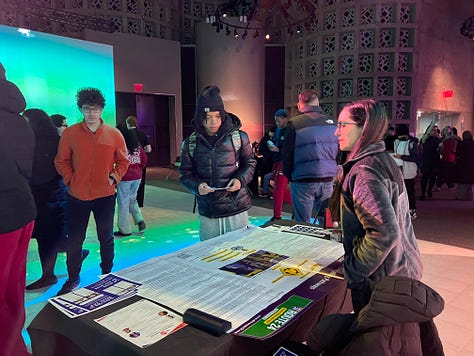

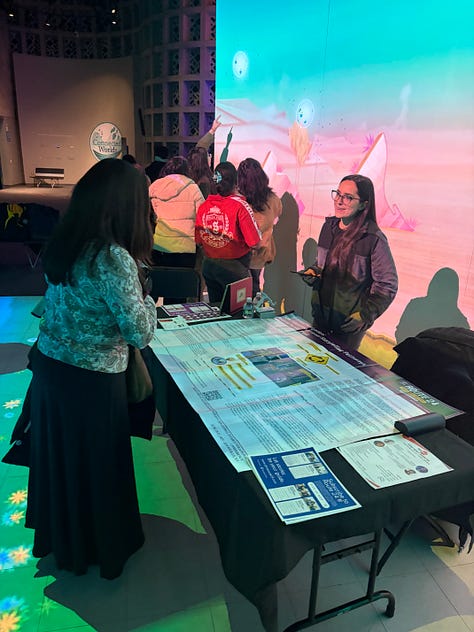
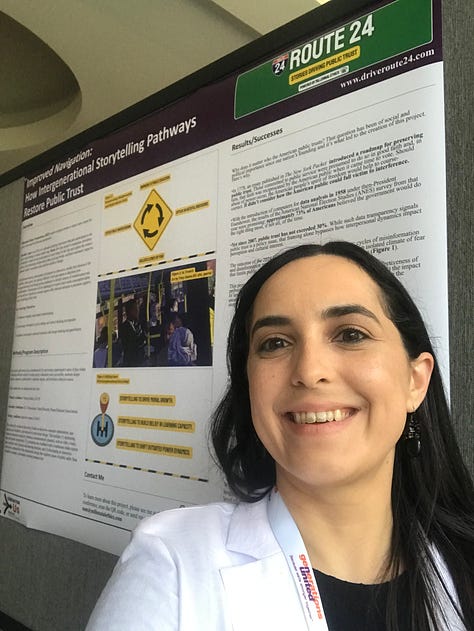
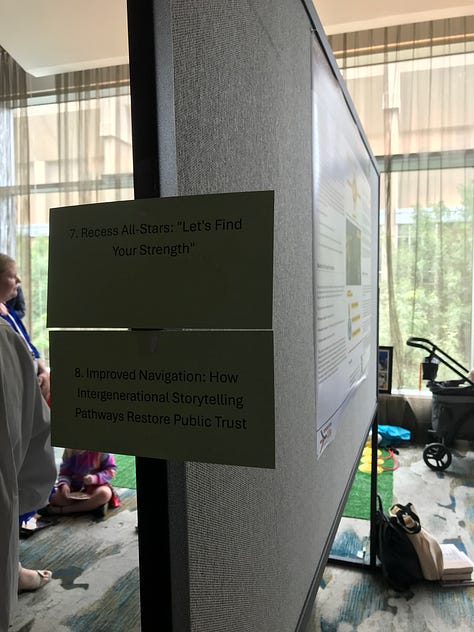
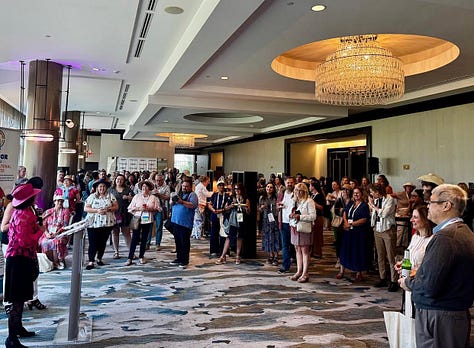
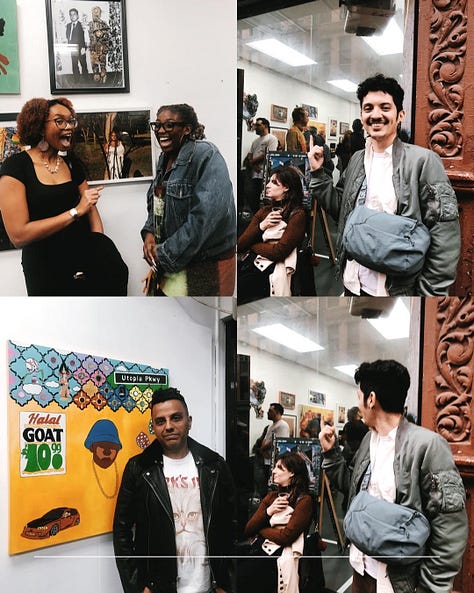
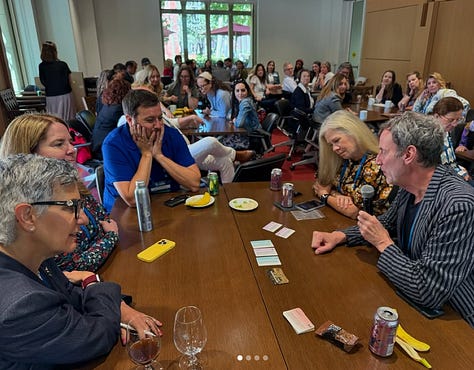
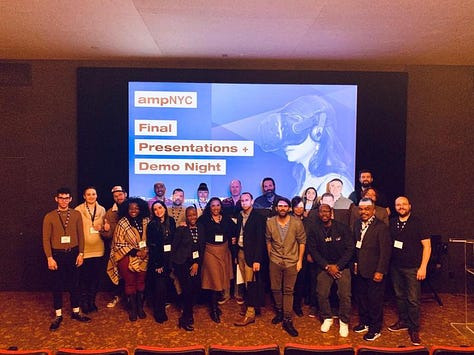
Free Ride
Route 24 is a late-night read that parks in your inbox two times a week, usually on Tuesday and Saturday nights.
Here’s what to expect with each newsletter:
Driver’s Ed - shifts your gears on key policy debates and test-drives people-powered solutions. Each month, I kick the tires on a new topic or angle the mainstream media often misses.
Scenic Route - immerses you in stories that engage play, enhance media literacy and civic understanding, and help you find a better view.
Rest Stop - a section that hits the brakes on current news cycles and tests tracks for inspiration. Formerly its own column. Stop by past examples.
Arcade Alley - a section that gives readers a behind-the-scenes look at some of the gaming features and design approaches that have informed our creative process on Probable Cause.
Tread Lightly - a section that gives readers a comedy pit stop, usually in the form of hilarious road signs.
In 2024, as part of Scenic Route, I wrote an anthology of short stories on current affairs, Whistle Stop Tour.
What are the perks of subscribing for free?
Free subscribers to Route 24 belong to a community of independent filmmakers, gamers, founders, and critical thinkers committed to democratizing access to innovative civc tech and ed tech for the public good.
Free subscribers also receive unlimited access to the most recent posts from Route 24’s archive.
Toll Booth
For subscribers in a position to financially support Route 24’s work and mission, you may make a one-time contribution or purchase a paid subscription. Your generous contributions help the project team iterate, travel, and scale while also keeping Route 24 accessible to all of our riders.
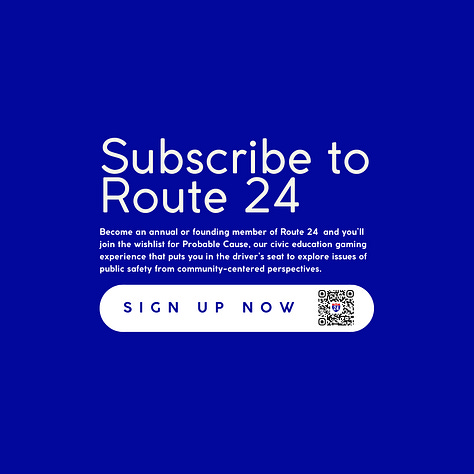
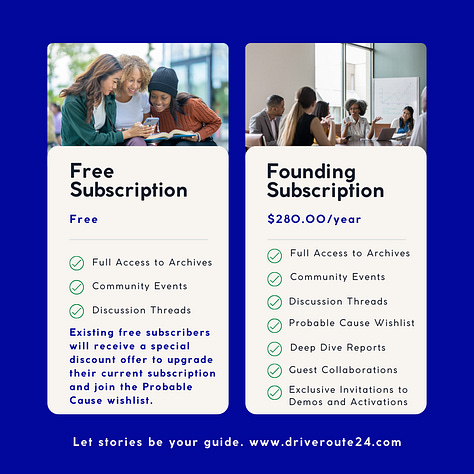
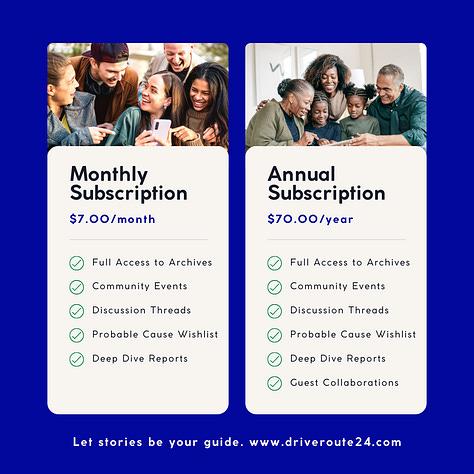
What are the perks of becoming a paid subscriber (e.g., monthly, annual, or founding subscription tiers)?
For $7/month or $70/year, paid subscribers receive personalized paid subscriber benefits, including but not limited to:
Unlimited access to the most recent posts from Route 24’s archive
Downloadable deep-dive reports
Probable Cause wishlist membership
Exclusive invitations to topical programming, such as:
Community events with values-aligned partners
Discussion threads with guest experts
What is the Probable Cause wishlist? Why join?
Paid subscribers to Route 24 are automatically added to the Probable Cause wishlist, which confirms pre-sales interest in buying and playing Probable Cause once it becomes available. You’ll also receive personalized benefits that grant paid subscribers exclusive access to early releases, industry insights, and community events.
For $280/year, founding members serve as Patrons of the Arts and receive personalized founding member benefits, including but not limited to:
Seasonal, handwritten notes of gratitude
Unlimited access to the most recent posts from Route 24’s archive
Exclusive invitations to topical programming, such as:
Community events with values-aligned partners
Early product demos and activations
Discussion threads with guest experts
Downloadable deep-dive reports
Probable Cause wishlist membership
What Route 24 Readers Are Saying
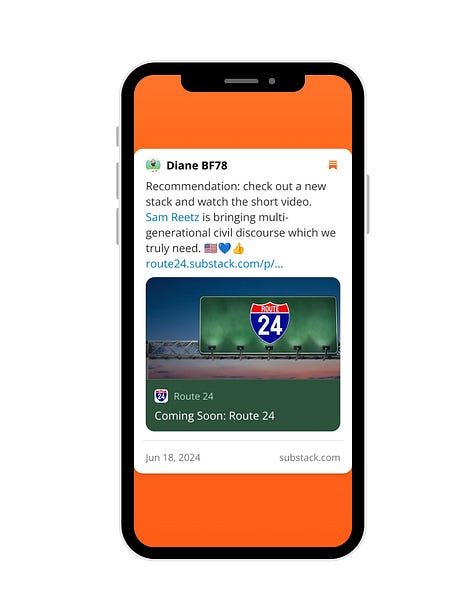
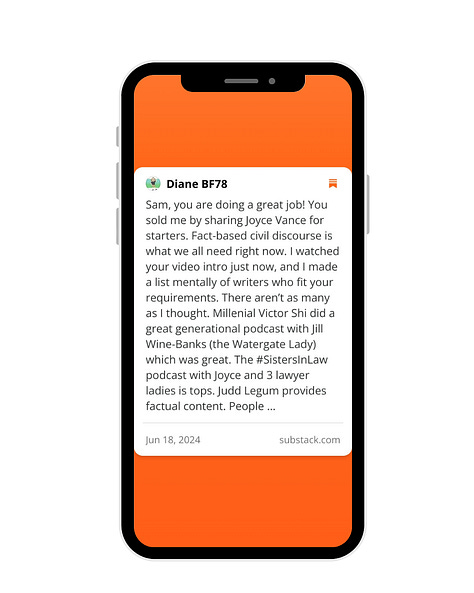
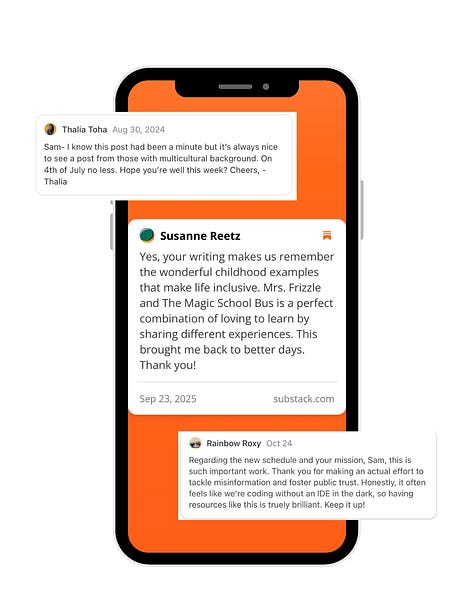
If you believe real change is driven by the people behind the wheel, come along for the ride:
Note: Route 24 is a fully independent newsletter and any paid subscriptions do not serve as contributions to any political campaign or political action committee.
Road Rules
Route 24 is a people-powered story engine where different perspectives are discussed. Policy debates are encouraged, so long as the lanes of disagreement are fact-supported. Hateful discourse will be deleted. Full stop.
Note: All opinions are entirely my own and not necessarily shared in part or in whole by any named persons, brands, or forums. Millennial Ethics is a pro-union entity and all projects are created in solidarity with union workers demands.
Jumpstart the conversation by restacking or cross-posting your favorite Route 24 read to help build this community.
As always, thank you for your support of independent storytellers, your faith in democracy, and above all, your commitment to humanity.
Stay the course,
Sam









